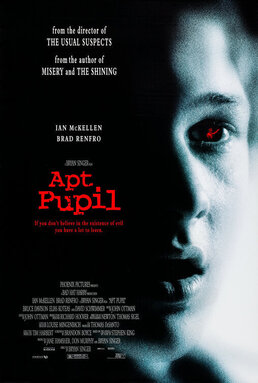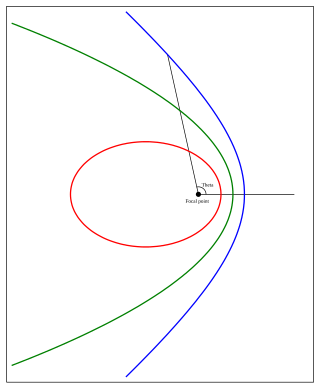
Ambiguity is the type of meaning in which a phrase, statement, or resolution is not explicitly defined, making several interpretations, others describe it as a concept or statement that has no real reference. A common aspect of ambiguity is uncertainty. It is thus an attribute of any idea or statement whose intended meaning cannot be definitively resolved, according to a rule or process with a finite number of steps.

Apt Pupil is a 1998 American psychological thriller film based on the 1982 novella of the same name by Stephen King. The film was directed by Bryan Singer and stars Ian McKellen and Brad Renfro. Set in the 1980s in southern California, the film tells the story of high school student Todd Bowden (Renfro), who discovers a fugitive Nazi war criminal, Kurt Dussander (McKellen), living in his neighborhood under a pseudonym. Bowden, obsessed with Nazism and the Holocaust, persuades Dussander to share his stories, and their relationship stirs malice in each of them. Singer has called Apt Pupil "a study in cruelty", with Nazism serving as a vehicle to demonstrate the capacity of evil.

In common usage and in philosophy, ideas are the results of thought. Also in philosophy, ideas can also be mental representational images of some object. Many philosophers have considered ideas to be a fundamental ontological category of being. The capacity to create and understand the meaning of ideas is considered to be an essential and defining feature of human beings.
Pleonasm is redundancy in linguistic expression, such as "black darkness" or "burning fire". It is a manifestation of tautology by traditional rhetorical criteria and might be considered a fault of style. Pleonasm may also be used for emphasis, or because the phrase has become established in a certain form. Tautology and pleonasm are not consistently differentiated in literature.

A character actor is an actor known for playing unusual or interesting characters in supporting roles. The term is somewhat abstract and open to interpretation. While all actors play "characters", the term character actor is often applied to an actor who frequently plays a distinctive and important supporting role. In another sense, a character actor may also be one who specializes in minor roles.

A close-up or closeup in filmmaking, television production, still photography, and the comic strip medium is a type of shot that tightly frames a person or object. Close-ups are one of the standard shots used regularly with medium and long shots. Close-ups display the most detail, but they do not include the broader scene. Moving toward or away from a close-up is a common type of zooming. A close up is taken from head to neck, giving the viewer a detailed view of the subject's face.
The continuous and progressive aspects are grammatical aspects that express incomplete action or state in progress at a specific time: they are non-habitual, imperfective aspects.

In astrodynamics, the orbital eccentricity of an astronomical object is a dimensionless parameter that determines the amount by which its orbit around another body deviates from a perfect circle. A value of 0 is a circular orbit, values between 0 and 1 form an elliptic orbit, 1 is a parabolic escape orbit, and greater than 1 is a hyperbola. The term derives its name from the parameters of conic sections, as every Kepler orbit is a conic section. It is normally used for the isolated two-body problem, but extensions exist for objects following a rosette orbit through the Galaxy.
In philosophy of science and philosophy of mind, cognitive closure is the proposition that human minds are constitutionally incapable of solving certain perennial philosophical problems. Owen Flanagan calls this position anti-constructive naturalism or the "new mysterianism" and the primary advocate of the hypothesis, Colin McGinn, calls it transcendental naturalism acknowledging the possibility that solutions may be knowable to an intelligent non-human of some kind. According to McGinn, such philosophical questions include the mind-body problem, identity of the self, foundations of meaning, free will, and knowledge, both a priori and empirical.

Eccentricity is an unusual or odd behavior on the part of an individual. This behavior would typically be perceived as unusual or unnecessary, without being demonstrably maladaptive. Eccentricity is contrasted with normal behavior, the nearly universal means by which individuals in society solve given problems and pursue certain priorities in everyday life. People who consistently display benignly eccentric behavior are labeled as "eccentrics".
Color digital images are made of pixels, and pixels are made of combinations of primary colors represented by a series of code. A channel in this context is the grayscale image of the same size as a color image, made of just one of these primary colors. For instance, an image from a standard digital camera will have a red, green and blue channel. A grayscale image has just one channel.
The Bible in Spain, published in London in 1843, is a travel book by the British writer George Borrow (1803–1881). It was a popular work when it appeared, running through several editions. Borrow tells of his travels through Spain while working as a Bible salesman in 1835–1838, during the Carlist Civil War. His activities on behalf of the Bible Society encountered much opposition from the Roman Catholic Church and from politicians.
Data conversion is the conversion of computer data from one format to another. Throughout a computer environment, data is encoded in a variety of ways. For example, computer hardware is built on the basis of certain standards, which requires that data contains, for example, parity bit checks. Similarly, the operating system is predicated on certain standards for data and file handling. Furthermore, each computer program handles data in a different manner. Whenever any one of these variables is changed, data must be converted in some way before it can be used by a different computer, operating system or program. Even different versions of these elements usually involve different data structures. For example, the changing of bits from one format to another, usually for the purpose of application interoperability or of the capability of using new features, is merely a data conversion. Data conversions may be as simple as the conversion of a text file from one character encoding system to another; or more complex, such as the conversion of office file formats, or the conversion of image formats and audio file formats.

In computing, an attribute is a specification that defines a property of an object, element, or file. It may also refer to or set the specific value for a given instance of such. For clarity, attributes should more correctly be considered metadata. An attribute is frequently and generally a property of a property. However, in actual usage, the term attribute can and is often treated as equivalent to a property depending on the technology being discussed. An attribute of an object usually consists of a name and a value. For an element these can be a type and class name, while for a file these can be a name and an extension, respectively.
A file format is a standard way that information is encoded for storage in a computer file. It specifies how bits are used to encode information in a digital storage medium. File formats may be either proprietary or free.
iConji is a free pictographic communication system based on an open, visual vocabulary of characters with built-in translations for most major languages.
Procter & Gamble v. Office for Harmonization in the Internal Market is a case before the European Court of Justice about the registration of 'BABY-DRY' as a trademark for baby diapers. OHIM refused the registration of the brand as a community mark saying that 'BABY-DRY' wasn't distinctive, but instead that it was descriptive without a secondary meaning.

Peter Labilliere (1725-1800), also known as Peter Labelliere, was the British Army Major buried upside down on Box Hill near Dorking in Surrey.
American eccentric cinema is a mode of contemporary American filmmaking that emerged in what has been termed the metamodern or new sincerity. Its attachment to indie cinema has led some to consider it a movement and genre of cinema in the United States. Its key filmmakers, including Wes Anderson, Charlie Kaufman, and Spike Jonze, are at times referred to as the "American Eccentrics". It occurred during the 1990s and 2000s, when indie directors sought to create films that diverted from the style and content of Hollywood franchise films. American eccentric cinema came in opposition to the mainstream ideas of formulaic narratives and the digitisation within films and new technologies that came about during the time period. American eccentric cinema is marked by films that are "deeply concerned with ethics and morality, the obligations of the individual, the effects of family breakdown, and social alienation."
Nebraska v. One 1970 2-Door Sedan Rambler (Gremlin) 191 Neb. 462, 215 N.W.2d 849 (1974) is a Nebraska Supreme Court civil forfeiture case. It was brought by the American state of Nebraska to seize a Rambler Gremlin on the sole grounds it was transporting illegal marijuana. The owner appealed against the forfeiture decision on the grounds of a claimed lack of due process. The court ruled 4–2 and sustained the confiscation as lawful.